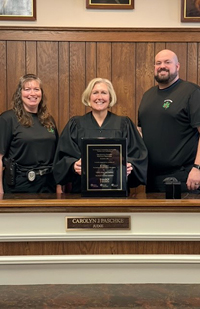Ohio Program to Serve as Mentor for Drug Courts Nationwide

Judge Carolyn Paschke (center) with New Leaf coordinator Maureen Maruna (left) and probation officer Greg Potts (right).

Judge Carolyn Paschke (center) with New Leaf coordinator Maureen Maruna (left) and probation officer Greg Potts (right).
The judicial system paved a path for two Ohio court employees on how to help people struggling with substance use. It’s a mission that gives them purpose locally and, now, nationally.
Geauga County Common Pleas Court staff members Maureen Maruna and Greg Potts founded the New Leaf Program three years ago. Now it’s one of 10 specialty courts nationwide recently selected to help other new or growing drug courts.
“There’s a belief that we have something special going here,” said Potts, a court probation officer. “We’re honored others see the same thing within us, and it makes us want to do even more.”
Maruna, a specialized docket coordinator, and Potts started developing Geauga County’s first specialty court at the request of Judge Caroline Paschke when they were hired a week apart in September 2018. Since then, they’ve created a model that’s working to change how the court and community respond to people struggling with substance use disorders.
Neither Maruna nor Potts originally envisioned helping people who come through the legal system. Maruna planned on being a nurse, and Potts had aspirations as a cruise director. But both their journeys steered them toward criminal justice. Once they started working within the system and learned more about it, they knew there were ways to help offenders chronically struggling to stay sober and out of jail.
“We want the high risk, high need people,” said Maruna, who previously managed a mental health court in Ashtabula County.
New Leaf’s status as a mentor court was recognized by the National Association of Drug Court Professionals (NADCP), an organization that offers training on the treatment court model to thousands of courts across the country. Presently, the U.S. has nearly 4,000 drug courts, including 259 in the state with full or initial certification by the Supreme Court of Ohio.
RELATED COVERAGE:
Drug Court’s HART-Felt Graduation
Single Mom Makes the Most of Drug Court’s Second Chance
Supreme Court Partnership First to Monitor Drug Court Participants
Ohio’s Founding Community Has Its First Certified Drug Court
Maruna, Potts, and other court personnel will spend the next three years providing guidance and technical assistance to fledgling drug courts. A main component will be offering innovative practices to maximize resources, engagement, and success rates. Many drug courts take a holistic approach to stabilize participants’ everyday needs through partnerships with community organizations to supply food, transportation, housing, and employment. Along with these crucial services, New Leaf has taken an educational and training component often incorporated within this kind of rehabilitation and elevated it by providing tuition to trade schools and colleges.
As participants progress through the six phases of the court’s 16- to 24-month program, their thoughts become clearer and more ambitious, Maruna said. Instead of worrying about how they’ll be able to feed their disease or survive the day, they can nourish their minds and their curiosities.
One person currently in the drug court recently said, “It’s the first time I’ve even had the ability to think about what I want to do with my life.”
The NADCP partnership also allows New Leaf to continue its growth. As a member of the mentor court network, the treatment team will receive additional training and assistance to help develop, identify, and test national best practices.
Maruna and Potts are happy with the early results, which include a 69% success rate – meaning graduation or good standing for current participants. Among the achievers are parents who barely had any visitation rights with their children when they first started in drug court but have worked to regain full custody. That ripple effect maintains the motivation within the New Leaf team to assist the individuals and families they routinely see in Geauga County and the millions of others like them across the country.
“We’re going to continue to grow and learn so that we can bring awareness to the benefits of specialized dockets,” said Potts.


